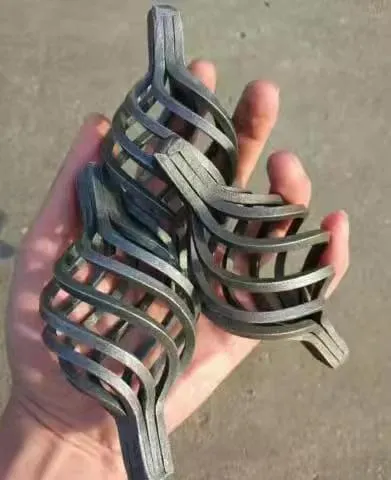metal rosettes
The Allure of Metal Rosettes Crafting Beauty Through Design
Metal rosettes have fascinated artisans, architects, and interior designers for centuries. These intricate decorative elements, often used in both classical and contemporary designs, provide not only aesthetic appeal but also structural support in a variety of applications. With roots tracing back to ancient cultures, metal rosettes have evolved into a versatile embellishment that enhances the beauty and elegance of diverse spaces.
Historical Significance of Metal Rosettes
The origin of rosettes can be traced to ancient Greece and Rome, where they served as ornamental motifs on architecture and sculpture. In these civilizations, the rosette symbolized beauty, harmony, and nature—their conch-like patterns often imitating flowers. During the Renaissance, the revival of classical styles brought rosettes back into vogue, often crafted from plaster or wood. With the advent of metalworking techniques in the subsequent centuries, metal rosettes emerged, allowing for more durability and complexity in design.
Modern Applications
Today, metal rosettes are widely used in various applications, from architectural elements to interior design. They can be found adorning door handles, light fixtures, and railings, as well as acting as focal points in a room. Their adaptability allows them to blend seamlessly into different design aesthetics—from rustic and vintage to sleek and contemporary.
In interior spaces, metal rosettes add a touch of elegance and sophistication
. Designers often incorporate them in crown moldings, ceiling decorations, or as accents on furniture. A single flourished metal rosette can transform a plain piece of furniture into a stunning focal point, capturing the eye and drawing attention to the craftsmanship involved.Materials and Finishes
metal rosettes

The choice of materials and finishes plays a crucial role in the visual impact of metal rosettes. They can be crafted from various metals, including brass, copper, iron, and aluminum, each offering distinct characteristics. Brass rosettes, for example, evoke a sense of warmth and history, while sleek aluminum can provide a modern and industrial feel.
Finishes can further enhance the aesthetic quality of these decorative items. Polished finishes give a reflective surface that can brighten a space, while antique or patina finishes add a sense of nostalgia and age. Additionally, coatings can be applied for protection against tarnishing, making them suitable for outdoor use without losing their beauty over time.
Installation and Maintenance
Installing metal rosettes can often be a straightforward process, requiring minimal tools and effort. They can be adhered to surfaces using strong adhesives or mechanically fastened to ensure stability. Whether used in large-scale installations or as small accents, proper placement is critical to achieving the desired visual impact.
Maintenance typically involves simple cleaning with a soft cloth to prevent dust accumulation. In environments where exposure to the elements is a concern, the choice of materials resistant to corrosion becomes essential. Regular maintenance ensures that the rosettes maintain their luster and continue to enhance the overall design of the space.
Conclusion
Metal rosettes are more than mere decorative elements; they are a celebration of craftsmanship, history, and design. Their ability to blend functionality with aesthetic appeal makes them a timeless choice for architects and designers alike. As trends in architecture and design continue to evolve, the enduring charm of metal rosettes will undoubtedly find its place, adorning our spaces with elegance and an appreciation for artistry. Whether in grand public buildings or intimate private homes, these captivating embellishments remind us of the beauty that can emerge from a perfect fusion of form and function.
-
Wrought Iron Components: Timeless Elegance and Structural StrengthNewsJul.28,2025
-
Window Hardware Essentials: Rollers, Handles, and Locking SolutionsNewsJul.28,2025
-
Small Agricultural Processing Machines: Corn Threshers, Cassava Chippers, Grain Peelers & Chaff CuttersNewsJul.28,2025
-
Sliding Rollers: Smooth, Silent, and Built to LastNewsJul.28,2025
-
Cast Iron Stoves: Timeless Heating with Modern EfficiencyNewsJul.28,2025
-
Cast Iron Pipe and Fitting: Durable, Fire-Resistant Solutions for Plumbing and DrainageNewsJul.28,2025
-
 Wrought Iron Components: Timeless Elegance and Structural StrengthJul-28-2025Wrought Iron Components: Timeless Elegance and Structural Strength
Wrought Iron Components: Timeless Elegance and Structural StrengthJul-28-2025Wrought Iron Components: Timeless Elegance and Structural Strength -
 Window Hardware Essentials: Rollers, Handles, and Locking SolutionsJul-28-2025Window Hardware Essentials: Rollers, Handles, and Locking Solutions
Window Hardware Essentials: Rollers, Handles, and Locking SolutionsJul-28-2025Window Hardware Essentials: Rollers, Handles, and Locking Solutions -
 Small Agricultural Processing Machines: Corn Threshers, Cassava Chippers, Grain Peelers & Chaff CuttersJul-28-2025Small Agricultural Processing Machines: Corn Threshers, Cassava Chippers, Grain Peelers & Chaff Cutters
Small Agricultural Processing Machines: Corn Threshers, Cassava Chippers, Grain Peelers & Chaff CuttersJul-28-2025Small Agricultural Processing Machines: Corn Threshers, Cassava Chippers, Grain Peelers & Chaff Cutters












